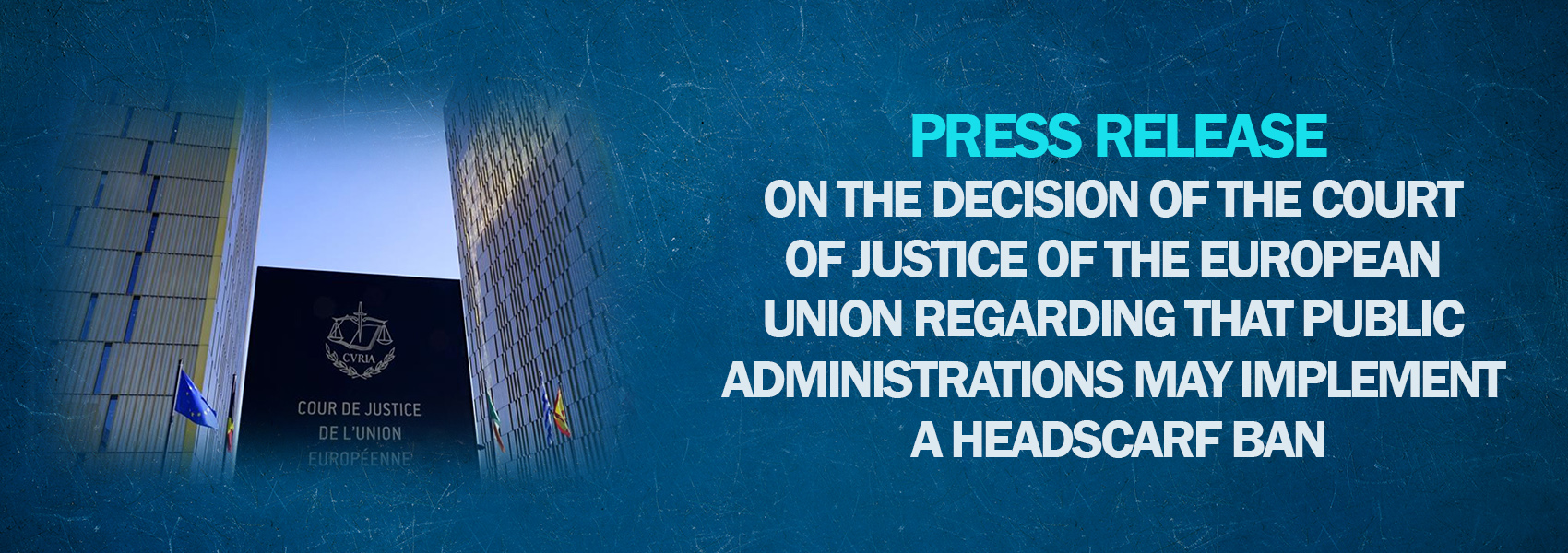
The news regarding the decision of the highest judicial organ of the European Union (EU), Court of Justice of the EU ruling that a municipality in Belgium implementing a headscarf ban not violating the freedom of religion or belief was seen in printed and visual media.
Freedom of religion and conscience are guaranteed in many international agreements, especially the United Nations (UN) Universal Declaration of Human Rights and the European Convention on Human Rights (ECHR). It is prohibited to discriminate against people because of their religion, belief or sect. According to European Court of Human Rights (ECHR), freedom of religion and conscience has two dimensions, namely internal (forum internum) and external (forum externum) and the internal dimension includes having freedom of thought, conscience and religious belief, freedom to change religion or belief and not believing. The external aspect includes the freedom to change one’s religion or belief and freedom, either alone or in community with others and in public or private, to manifest one’s religion or belief, in worship, teaching, practice and observance. While religious freedom is primarily a matter of individual conscience, it also implies, inter alia, freedom to 'manifest [one’s] religion'. Bearing witness in words and deeds is bound up with the existence of religious convictions (CJEU, Kokkinakis v. Greece, B. No: 14307/88, 25/5/1993, para. 31).
The freedom of religion and belief was expressed as such in the General no. 22 of UN Human Rights Committee (HRC): “The freedom to manifest religion or belief may be exercised 'either individually or in community with others and in public or private'. The freedom to manifest religion or belief in worship, observance, practice and teaching encompasses a broad range of acts. The concept of worship extends to ritual and ceremonial acts giving direct expression to belief, as well as various practices integral to such acts, including the building of places of worship, the use of ritual formulae and objects, the display of symbols, and the observance of holidays and days of rest. The observance and practice of religion or belief may include not only ceremonial acts but also such customs as the observance of dietary regulations, the wearing of distinctive clothing or headcoverings, participation in rituals associated with certain stages of life, and the use of a particular language customarily spoken by a group.” (UN Human Rights Committee (HRC), CCPR General Comment No. 22: Article 18 (Freedom of Thought, Conscience or Religion, 48th session, (1993), para. 4)
Despite these important guarantees at international agreement level, Islamophobia still comes to light frequently. This decision by the Court of Justice of the EU is one of the most apparent examples of this.
In the Article 3 of Law no. 6701 "it is prohibited to discriminate against persons based on the grounds of sex, race, colour, language, religion, belief, sect, philosophical or political opinion, ethnical origin, wealth, birth, marital status, health status, disability and age" in the enjoyment of legally recognized rights and freedoms. In the sub-paragraph (m) of the 1st paragraph of Article 9, "following and assessing international developments in areas of human rights and non-discrimination" is listed as one of the duties of the Institution.
Within this framework, our Institution, main mission of which is to protect the right to equal treatment of persons on the basis of human dignity and prevention of discrimination in exercising the legally acknowledged rights and freedoms, condemns this unlawful decision of Court of Justice of EU.
Respectfully announced to the public.